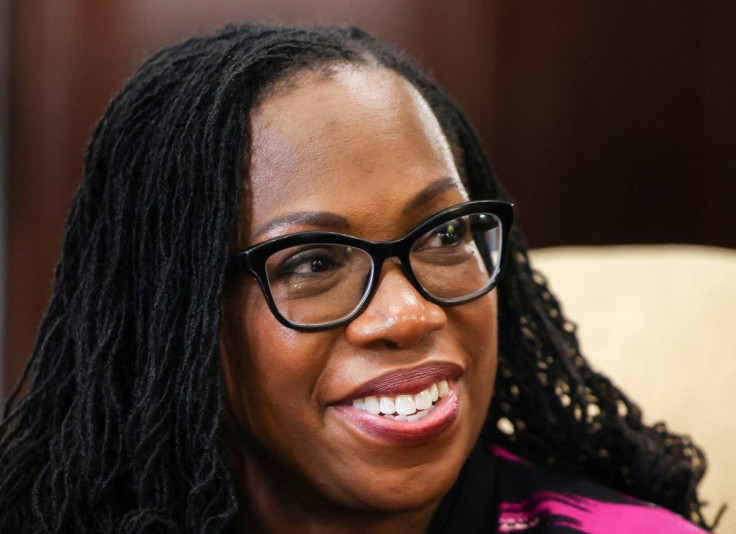U.S. Supreme Court Pick Jackson Stresses God And Country Amid Republican Attacks

Ketanji Brown Jackson, President Joe Biden's nominee to become the first Black woman on the U.S. Supreme Court, stressed her patriotism and Christian faith on Monday while Republicans asked whether she has a hidden agenda that favors criminals.
In her opening statement during her Senate Judiciary Committee confirmation hearing, Jackson said she was blessed to be "born in this great nation" and added: "I must also pause to reaffirm my thanks to God, for it is faith that sustains me at this moment." Jackson, 51, pledged independence if confirmed by the Senate to the nation's top judicial body and embraced a limited role for jurists.
Jackson, who has served since last year as a federal appellate judge after eight years as a federal district court judge, also reflected on opportunities she had that her parents, who grew up in era of racial segregation in the South, did not.
"My parents taught me that, unlike the many barriers that they had had to face growing up, my path was clearer, such that if I worked hard and believed in myself, in America I could do anything or be anything I wanted to be," Jackson said.
In opening statements by committee members, Democrats hailed the historic nature of Jackson's selection for the lifetime post and praised her judicial record. Republicans took aim at her record and tried to link her to advocacy groups on the left, while some tried to paint Jackson as "soft on crime."
The harshest attacks came from Senators Josh Hawley and Marsha Blackburn. Hawley has suggested Jackson was overly lenient toward certain child pornography defendants when sentencing them to prison terms - claims that sentencing experts have called misleading.
"I can only wonder: what's your hidden agenda?" Blackburn asked. "Is it to let violent criminals, cop killers and child predators back to the streets?"
As the hearing unfolded, Biden touted Jackson on Twitter as "a brilliant legal mind." Biden, who as a candidate in 2020 pledged to appoint a Black woman to the court, last month nominated Jackson to succeed retiring liberal Justice Stephen Breyer, 83.
"Members of this committee: If I am confirmed, I commit to you that I will work productively to support and defend the Constitution and the grand experiment of American democracy that has endured over these past 246 years," Jackson said.
"I have been a judge for nearly a decade now, and I take that responsibility and my duty to be independent very seriously. I decide cases from a neutral posture. I evaluate the facts, and I interpret and apply the law to the facts of the case before me, without fear or favor, consistent with my judicial oath," she added.
Her confirmation would not change the ideological balance of the Supreme Court, which includes three conservative justices appointed by Biden's Republican predecessor Donald Trump. But it would let Biden freshen the court's liberal bloc with a justice young enough to serve for decades.
'NOT EASY'
If confirmed, she would be the 116th justice to serve on the high court, the sixth woman and the third Black person. With Jackson on the bench, the court for the first time would have four women and two Black justices.
"It's not easy being the first. You have to be the best and in some ways the brightest," Democratic Senator Dick Durbin, the committee's chairman, told her.
Durbin said attacks on Jackson's approach to criminal justice issues are baseless and her judicial record showed she would not be a "rubber stamp" for Biden. Durbin noted that law enforcement organizations including the Fraternal Order of Police have endorsed Jackson's nomination.
Jackson faces questions from senators on Tuesday and Wednesday. Republicans said among other things they would ask her whether she supports efforts on the left to expand the Supreme Court to erase its current 6-3 conservative majority.
Republican Senator Ted Cruz sought to tie Jackson to Democratic criminal justice reform proposals pursued following the 2020 George Floyd killing in Minneapolis - efforts Republicans suggest caused a rise in violent crime.
Senator Lindsey Graham, one of three Republicans who voted to confirm Jackson to her current position, said Black and Hispanic Republican judicial nominees have been asked tough questions by Democrats in prior confirmation hearings but Republicans would be called racists if they do the same.
"It's about 'we're all racists if we ask hard questions.' That's not gonna fly with us. We're used to it by now," Graham said.
Biden's fellow Democrats narrowly control the Senate, which has the authority under the U.S. Constitution to confirm a president's judicial appointments. A simple majority vote is needed for confirmation, meaning Jackson would get the job if all Democrats are united regardless of what Republicans do in a Senate divided 50-50 between the two parties.
The Senate previously confirmed Jackson to three posts including last year, when Biden nominated her to the U.S. Court of Appeals for the District of Columbia Circuit. Jackson was raised in Miami and attended Harvard Law School, later serving as a Supreme Court clerk for Breyer.
The two Black justices previously confirmed by the Senate were: Clarence Thomas, appointed in 1991 and still serving, and Thurgood Marshall, who retired in 1991 and died in 1993. Thomas, 73, is currently hospitalized after experiencing flu-like symptoms, though he does not have COVID-19, according to a court spokesperson.
© Copyright Thomson Reuters {{Year}}. All rights reserved.





















